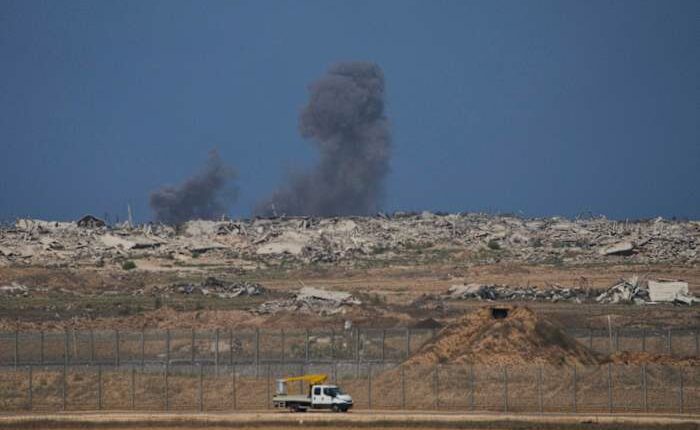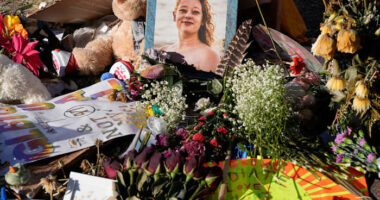Share this @internewscast.com

DEIR EL-BALAH – Demonstrators gathered on Israeli streets for a “day of disruption” on Wednesday, protesting against the mobilization of tens of thousands of reservists for an offensive criticized worldwide and sparking concerns in Israel regarding hostages still held in Gaza.
These protests, part of ongoing unrest in Israel, blame Prime Minister Benjamin Netanyahu and his government for not securing a ceasefire and instead escalating an invasion, which hospitals in Gaza report is already leading to increased casualties during its early phase.
“Extreme actions are necessary to ensure someone remembers. A state must not abandon its citizens,” stated Yael Kuperman, a protester near the Knesset, speaking to Israeli public broadcaster Kan.
Strikes hit both Gaza City and southern Gaza as Israel urges evacuation
Meanwhile, hospital officials told The Associated Press at least 24 people were killed in strikes overnight into Wednesday.
Nasser Hospital reported receiving 10 bodies, including one aid-seeker in Rafah and a child killed by a strike in southern Gaza. Shifa Hospital reported 14 bodies, including two children and four women, arrived on Wednesday, and Al-Quds Hospital reported another individual killed by Israeli strikes.
According to Israel, Gaza City — the most significant Palestinian city in the besieged strip or the occupied West Bank — remains a Hamas bastion, lying above what military officials describe as an extensive underground tunnel network, even after earlier raids in the conflict.
Israel has increased air and ground attacks on the periphery of Gaza City, especially in western districts, prompting residents to flee towards the coast, as reported by humanitarian groups coordinating assistance for those displaced.
Site Management Cluster, one such group, said on Wednesday that families were trapped by the prohibitively high cost of moving, logistical hurdles and a lack of places to go.
“Palestinians are also reluctant to move due to the fear of not being able to return or exhaustion from repeated displacement,” it said.
Hospitals report dozens killed as international outrage grows
The twin threats of combat and famine, Palestinians and aid workers say, are only growing more acute for families in Gaza City, the vast majority of whom have reported being displaced multiple times during the 23-month war.
Hospital officials and Gaza’s Health Ministry said Wednesday the death toll kept climbing, with people killed in airstrikes while trying to reach aid, or from hunger.
The ministry said 113 Palestinians were killed on Tuesday — more than half in Gaza City — over the past 24 hours.
The toll reported was a casualty count seen regularly in recent weeks and came a day after Netanyahu and Israeli commanders told reservists the offensive was entering what they hoped would be a “decisive stage” of the war.
The ministry reported on Wednesday that five adults and one child died from malnutrition over the past day, bringing the total toll to 367, including 131 children throughout the war.
The ministry reported on Tuesday that 63,633 Palestinians have been killed, including more than 2,300 seeking aid, since the war started Oct. 7, 2023, with a Hamas-led attack on Israel.
Part of the Hamas-run government but staffed by medical professionals, it doesn’t differentiate between civilians and combatants in its count, but says women and children make up around half of the dead.
U.N. agencies and many independent experts consider the ministry’s figures to be the most reliable estimate of war casualties. Israel disputes them, but hasn’t provided its own toll.
In a letter sent as members of Parliament returned to work in the United Kingdom, three non-governmental organizations highlighted how more than 3,700 Palestinians were killed over the body’s 34-day summer break.
Amnesty International, Doctors Without Borders and Medical Aid for Palestinians accused Israel of genocide — a charge it has previously denied. The organizations demanded the British government take action, noting famine, a collapse of the health care system and the killing of Mariam Abu Dagga, a visual journalist who had worked for The Associated Press and Doctors Without Borders.
“This is not merely a humanitarian crisis — it is a full-blown and man-made human rights catastrophe,” the statement said. “Expressions of ‘deep concern’ are not enough.”
___
Metz reported from Jerusalem and Khaled from Cairo. Associated Press writer Julia Frankel in Jerusalem contributed to this report.
___
Copyright 2025 The Associated Press. All rights reserved. This material may not be published, broadcast, rewritten or redistributed without permission.











